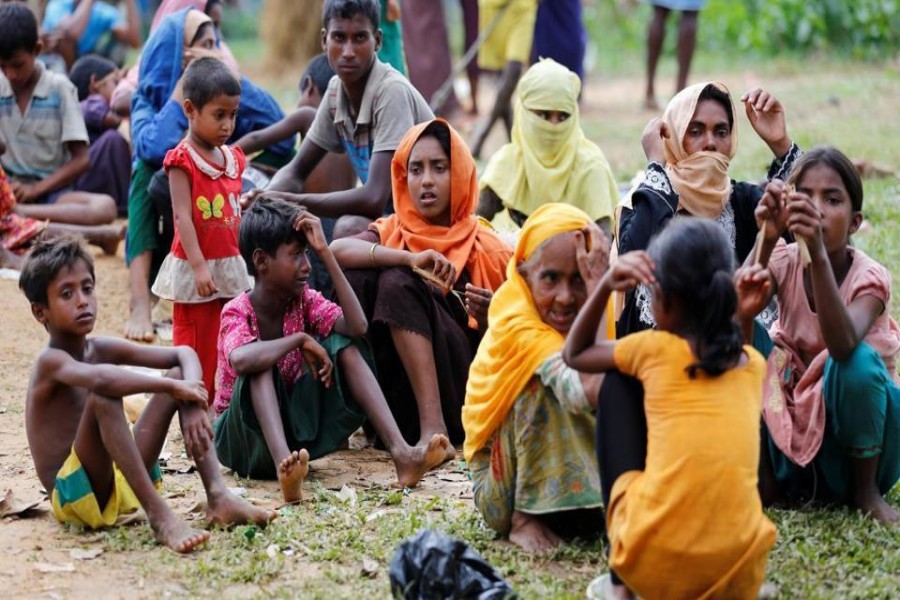Myanmar security forces have committed widespread rape against women and girls as part their operation to decimate Rohingya Muslims from the country’s Rakhine State, reveals a Human Rights Watch report.
The 37-page report, "All of My Body Was Pain': Sexual Violence Against Rohingya Women and Girls in Burma," published Wednesday, documents the Burmese military's gang rape of Rohingya women and girls and further acts of violence, cruelty, and humiliation.
"Rape has been a prominent and devastating feature of the Burmese military's campaign of ethnic cleansing against the Rohingya," said Skye Wheeler, women's rights emergencies researcher at Human Rights Watch and author of the report. "The Burmese military's barbaric acts of violence have left countless women and girls brutally harmed and traumatised."
The UN Security Council should impose a full arms embargo on Myanmar and individual sanctions against military leaders responsible for grave violations of human rights, including sexual violence, said the global rights body.
The council should also refer the situation in Rakhine State to the International Criminal Court, it said.
It should request a public briefing from the UN special representative of the secretary-general for sexual violence in conflict, who just returned from the Rohingya camps in Bangladesh.
"UN bodies and member countries need to work together to press Burma to end the atrocities, ensure that those responsible are held to account, and address the massive problems facing the Rohingya, including victims of sexual violence," Wheeler said. "The time for consequences is now, otherwise future Burmese military attacks on the Rohingya community appear inevitable."
Many women described witnessing the murders of their young children, spouses, and parents. Rape survivors reported days of agony walking with swollen and torn genitals while fleeing to Bangladesh.
Since August 25, the Burmese military has committed killings, rapes, arbitrary arrests, and mass arson of homes in hundreds of predominantly Rohingya villages in northern Rakhine State, forcing more than 620,000 Rohingya to flee to neighbouring Bangladesh.
Human Rights Watch has found that these abuses amount to crimes against humanity under international law, reports UNB.
Human Rights Watch interviewed 52 Rohingya women and girls who had fled to Bangladesh, including 29 rape survivors, 3 of them girls under 18, as well as 19 representatives of humanitarian organisations, United Nations agencies, and the Bangladeshi government.
The rape survivors came from 19 villages in Rakhine State.
Burmese soldiers raped women and girls both during major attacks on villages and in the weeks prior to these attacks after repeated harassment, Human Rights Watch found.
In every case described to Human Rights Watch, the rapists were uniformed members of Burmese security forces, almost all military personnel.
Ethnic Rakhine villagers, acting in apparent coordination with Burmese military, sexually harassed Rohingya women and girls, often in connection with looting.
Fifteen-year-old Hala Sadak, from Hathi Para village in Maungdaw Township, said soldiers had stripped her naked and then dragged her from her home to a nearby tree where, she estimates, about 10 men raped her from behind. She said, "They left me where I was...when my brother and sister came to get me, I was lying there on the ground, they thought I was dead."
All but one of the rapes reported to Human Rights Watch were gang rapes.
In six reported cases of "mass rape," survivors said that soldiers gathered Rohingya women and girls into groups and then gang raped or raped them.
Many of those interviewed also said that witnessing soldiers killing their family members was the most traumatic part of the attacks.
Humanitarian organisations working with refugees in Bangladesh have reported hundreds of rape cases.
These most likely only represent a small proportion of the actual number because of the significant number of reported cases of rape victims being killed and the deep stigma that makes victims reluctant to report sexual violence, especially in crowded emergency health clinics with little privacy.
Two-thirds of rape survivors interviewed had not reported their rape to authorities or humanitarian organisations.
Many reported symptoms of post-traumatic stress disorder or depression, and untreated injuries, including vaginal tears and bleeding, and infections.
"One tragic dimension of this horrific crisis is that Rohingya women and girls are suffering profound physical and mental trauma without getting needed health care," Wheeler said. "Bangladeshi authorities and aid agencies need to do more community outreach among the Rohingya to provide confidential spaces to report abuse and reduce stigma around sexual violence."
Burmese authorities have rejected the growing documentation of sexual violence by the military. In September, the Rakhine state border security minister denied the reports. "Where is the proof?" he said. "Look at those women who are making these claims - would anyone want to rape them?"
The Myanmar government should end the violations against the Rohingya immediately, cooperate fully with international investigators, including the Fact-Finding Mission established by the UN Human Rights Council, and allow humanitarian aid organisations unimpeded access to Rakhine State, said the global rights body.


